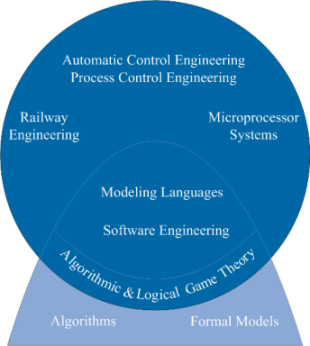The DFG Research Training Group (DFG-Graduiertenkolleg) 1298
************************************************************************
is an interdisciplinary research project at the RWTH Aachen University led by a group of ten professors representing five different disciplines. Integrating approaches from computer and engineering sciences, the project aims at developing methods for the automatised design of soft- and hardware.

While methods of software validation and verification are by now well established, based on adequate formal models and tested in practical applications, the approach of automatic synthesis of software (and hardware) is as yet only developed in quite rudimentary form. On the other hand, in theoretical computer science as well as in engineering disciplines a rapidly increasing stock of techniques for the development of algorithmic synthesis procedures is emerging, triggered by the demand to decrease development costs by invoking algorithmics in formal modelling frameworks. However, the approach of program synthesis is only applicable in restricted scenarios, in particular in reactive (multi-agent) systems with low data complexity and in control systems. Central issues in the area are the establishment of system models which allow an algorithmic solution of the synthesis problem, the combination of discrete and continuous pararameters in hybrid systems (as this is also familiar from verification), and the exploration of the potential of applications. The aim of the Graduate School is to unify the expertise from Computer science, mathematics, and four engineering disciplines (processor architectures, automatic control, process control engineering, train traffic systems) and to push forward the desired integration of methods. The research will be carried out in four subject areas: Algorithmics for agent-based probabilistic and hybrid systems, formal methods of reactive systems and game-theoretic methods, software development and modelling languages, and finally applications and demonstrators.
